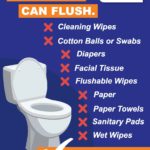What’s Safe to Flush or Drain?
Disposing of the wrong items in a toilet or drain can cause blockages and slow drainage, flooding, and hazardous sewage back-ups into your home or yard. Fixing them can require costly and disruptive repairs for you and MSD and contributes to sewer rate increases for the whole community. Don’t let your hard-earned money go down the drain. Follow these guidelines at home and work.
The sewer pipes that serve the toilet, shower, bath, sinks, washing machine, and floor drains in your home or business are designed to carry only three things: human body waste, toilet paper, and wastewater. When other items are put down the drain, they can combine to cause clogs, put additional stress on the pipes, or get caught up in our wastewater treatment facilities. This material then needs to be trucked to a landfill, causing extra work and expense for MSD, and higher rates for customers.
Learn more about what can be flushed at:
Don't
Never dispose of these items in sinks, drains, or toilets:
- Automobile fluids (motor oil, antifreeze, etc.)
- Bandages
- Batteries
- Bones
- Bread Dough
- Butter
- Cat Litter
- Cheese
- Cigarettes & Butts
- Cleaning Supplies
- Coffee Grounds or Filters
- Cotton Balls or Swabs
- Condoms
- Cooking Oil
- Dental Floss
- Diapers (children or adult)
- Eggshells
- Facial Tissue
- Fat, Oil, or Grease (FOG)
- Food Solids
- “Flushable” Wipes
- Glue
- Gravy
- Hair or Fur
- Insects
- Mayonnaise
- Meat Drippings
- Medicines (prescribed and over-the-counter)
- Oatmeal
- Paint
- Paper
- Paper Towels
- Perfume
- Pesticides
- Pet Waste Bags
- Rags
- Rubber Bands
- Salad Dressing
- Sanitary Pads
- Solvents
- Sponges
- Syringes
- Tampons
- Toothpaste
- Vegetables
- Wet Wipes
- Yard Debris
Do
Follow these tips to make it easier to keep harmful materials out of our sewers:
- Place a wastebasket in your bathrooms for disposing of feminine hygiene products, diapers, cotton balls, cotton swabs, cleansing wipes, dental floss, and paper towels.
- Place liquid cooking fats, oils, and grease (FOG) into a jar or container with a lid and dispose in the trash.
- Wipe down greasy pots, pans, and dishes with paper towels before washing to reduce the amount of FOG that goes into the drain.
- Have your sewer rodded or snaked regularly to remove tree root growth or other potential blocks, and keep your pipes flowing clearly.
- Dispose of old medications or drugs at an approved drug take-back site or event.
- Dispose of motor oil, paint, grease, or other dangerous fluids at the St. Louis Household Hazardous Waste collection facility.
Contact MSD anytime you experience sewer backup problems.


